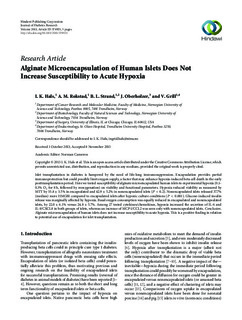Alginate Microencapsulation of Human Islets Does Not Increase Susceptibility to Acute Hypoxia
Hals, Ingrid Katrin; Rokstad, Anne Mari; Strand, Berit Løkensgard; Oberholzer, José; Grill, Valdemar
Abstract
Islet transplantation in diabetes is hampered by the need of life-long immunosuppression. Encapsulation provides partial immunoprotection but could possibly limit oxygen supply, a factor that may enhance hypoxia-induced beta cell death in the early posttransplantation period. Here we tested susceptibility of alginate microencapsulated human islets to experimental hypoxia (0.1–0.3% O2 for 8 h, followed by reoxygenation) on viability and functional parameters. Hypoxia reduced viability as measured by MTT by % in encapsulated and % in nonencapsulated islets (). Nonencapsulated islets released 37.7% (median) more HMGB1 compared to encapsulated islets after hypoxic culture conditions (). Glucose-induced insulin release was marginally affected by hypoxia. Basal oxygen consumption was equally reduced in encapsulated and nonencapsulated islets, by % versus %. Among 27 tested cytokines/chemokines, hypoxia increased the secretion of IL-6 and IL-8/CXCL8 in both groups of islets, whereas an increase of MCP-1/CCL2 was seen only with nonencapsulated islets. Conclusion. Alginate microencapsulation of human islets does not increase susceptibility to acute hypoxia. This is a positive finding in relation to potential use of encapsulation for islet transplantation.

